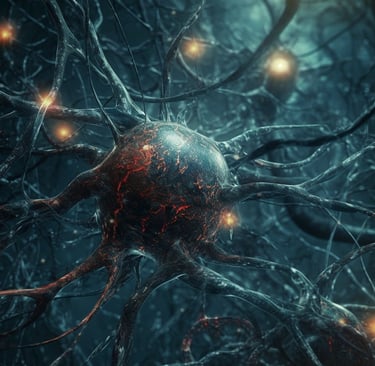Save Your Immortal Soul -- In Code
Can information technology provide a path to Immortality?
6/3/20245 min read
Immortality
The concept of immortality, living beyond death, has fascinated humanity for centuries. The fear of death and the longing to continue existing after our physical bodies expire have been powerful motivators in the development of religion. From ancient religions to modern philosophies, the concept of the immortal soul has been a cornerstone of human thought. Surprisingly, advancements in technology and medicine have brought us closer to achieving immortality, though not in the traditional sense. While the idea of living forever may still seem like a distant dream, the pursuit of longevity and the potential to extend human life through scientific means is becoming increasingly plausible. The quest for immortality continues to shape our beliefs and drive our curiosity about what lies beyond mortality.
What Makes You -- "You?"
At the heart of this quest is the understanding of consciousness. The intricate network of neurons and synapses in our brains houses our memories, thoughts, and personality—essentially, what makes you "you". The human brain contains about 100 billion neurons and each neuron may be connected to up to 10,000 other neurons, passing signals to each other via as many as 1,000 trillion synapses. The synapse permits a neuron to pass an electrical or chemical signal to another neuron or to the target effector cell. While neuroscientists are still trying to understand the nuances of the human mind, essentially you, your personality, you memories, your thoughts, your behavior, your hope and dreams, your consciousness exist based on the number of, connections between, and interactions of the neurons and synapses in your brain. Together, their structure and unique interaction represent the essence of who you are -- what many typically regard as the soul.


Research is underway all over the world that would perfectly copy this collection of neurons and synapses into a form that could be transferred into a computer. By uploading your mind to a computer, you could transcend the limitations of the biological body, gaining new, enhanced abilities as technology evolves. Some techniques are destructive, shaving slices of the brain only atoms thick. Some non-destructive, mapping the interactions over time as they are used or where the neural fibers connecting the two cortical hemispheres are severed and signals monitored from both sides. Regardless of the technique, it's called "Mind Uploading" and the primary objective is to be able to create an exact copy of the neurons, synapses, and interaction between them into a computer -- And make them operate just as they do in your head. The vision of Mind Uploading involves creating a Brain Operating System (BOS) that replicates human consciousness
Technology -- You Improve Constantly
Let's assume we were able to do that today. Next, we to add sensory input "drivers" into the BOS, similar in concept to the drivers in your personal computer that provides a common interface on one side for the operating system and on the other, the ability to control specific hardware: printers, cameras, hard drives, etc. Drivers allow the BOS's interface to types of devices to remain relatively unchanged while allowing the devices to be updated to take advantage of newer and better technology. These bio-drivers would mock the computer equivalent of the human senses: vision, hearing, taste, smell, touch, and the ability to speak. For example, connecting what would look like the Optic nerve from the BOS's perspective to to a webcam or the Cochlear nerve in the inner ear to a microphone, etc. Of course, the BOS is going to have to do some new learning in order to see, hear, and speak but it's very clever about relearning that sort of thing.
By uploading your mind to a computer, you could transcend the limitations of the biological body, gaining new, enhanced abilities as technology evolves. Maybe replace the webcam with precision optics perhaps with something like 12 x optical magnification or infrared imaging. Microphones for ears that allow you to hear silent conversations from a distance or tune into subsonic sounds. Since you are in software, you no longer can "die" -- as long as you have a good backup of course. These enhancements could be updated continuously, making you an ever-advancing entity in a digital paradise.
Extraordinary Mobility and Connectivity
Digital immortality offers unparalleled mobility. The ultimate target would be a fully functioning android, a robot in human form under your BOS control. A new, super strong body. No aches, no pains, and new or improved parts could be added at any time. Just how strong or fast would you like to be? With a body constructed of linear motors and mobile hydraulics, you could easily be a magnitude more powerful than any elite athlete on the planet.
For information connectivity, a driver links your BOS directly to the internet. There is research being done in quantum entanglement which explores the phenomenon of paired particles where when the state of one particle is changed, the other paired particle also changes to that same state instantly and over infinite space! Something Einstein called "spooky action at a distance" in 1935. -- Quantum entanglement could facilitate instantaneous data transfer, allowing your consciousness to traverse the globe or even explore outer space in real-time. Think of the possibilities if you could directly access the internet at those speeds -- or perhaps more importantly, transfer data at faster than light speeds, including your BOS software.


"Life" in a Machine
Maybe you want to take a trip to Tahiti. And like all futuristic travel destinations, they have a Rent-An-Android office. You could transfer your BOS there in a few seconds into the rental android. Perhaps you'd rather visit the International Space Station or an outpost on Mars. As long as there were accessible androids at these or any other location, it would be a possibility. Plus you don't have to worry about food -- you don't need to eat or drink. You don't have to worry about air pollution or catching something -- you don't breathe. Not to mention you can explore (or work) 24x7 since you don't need to sleep either. Just a quick recharge of your batteries and you're good to go -- unless you stepped up to that nuclear model that provides power for decades. So, now that you can live forever, what do you do? You have all the time in the world to do whatever you want. Do you just go on and on and on until there is just nothing left to do -- to desire. At what point does life stop making sense and you just decide to turn the power off?
Sound a bit like science fiction? Of course, but there is well funded research currently going on in all these areas the world over -- including involvement from people like of Elon Musk. We expect to see something like all this happen by 2055. But what would this say about our species? What happens to humans in this kind of a world? What would normal humans be needed for -- anything? They pollute, they consume more and more resources as the world population continues to increase, and they are effectively destroying the Earth's ability to support human life. There is no longer a need to reproduce in order to pass what we have to future generations. There are no future generations. What happens if or when the androids decide humans are no longer necessary.
Does God Still Exist?
Ultimately, the question is, for those that believe there is a God, where is God in this scenario? -- is God still God for these androids, these machines? If the essence of "you" now resides in software, do you still answer to God? Maybe God simply disappears when there are no more humans inhabiting the planet? We'd sure like to know -- This day is coming.
Note:
This website will barely touch the surface of certain complex subjects; Astronomy, Physiology, Physics, Quantum Mechanics that even today's scientists don't completely understand. Our intent is to present an overview of the relevant aspects of these topics and then provide suggested search topics so you can explore them to your level of interest and satisfaction.
Suggesged Searches
© Copyright Fundamental Deist
